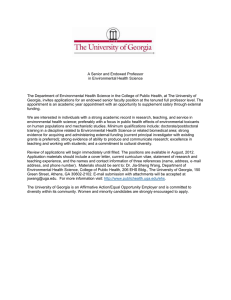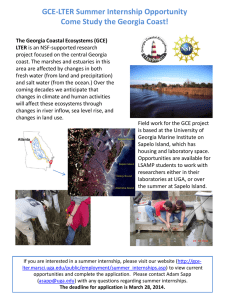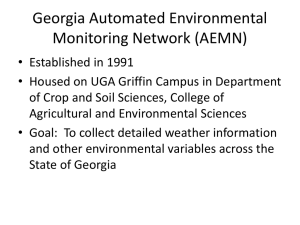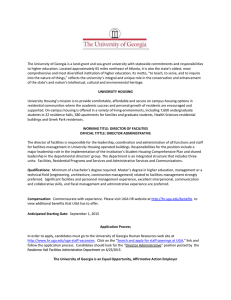Water Issues in Georgia A Survey of Public Perceptions and
advertisement
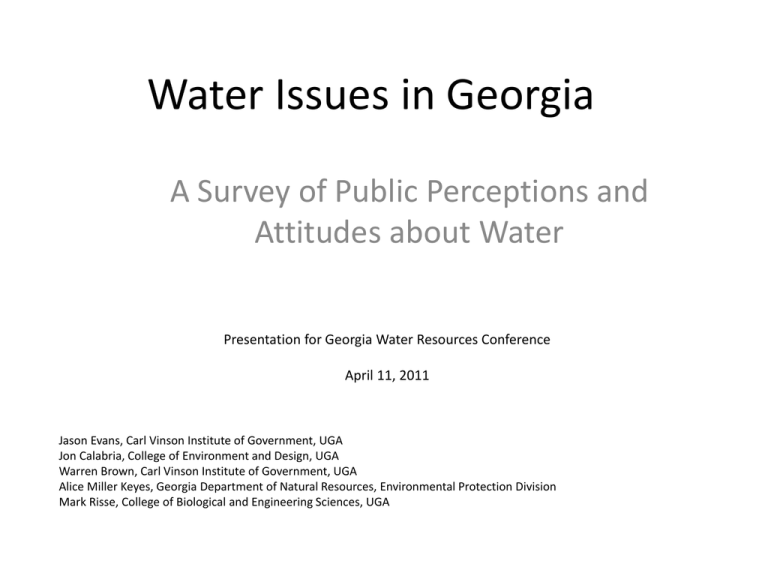
Water Issues in Georgia A Survey of Public Perceptions and Attitudes about Water Presentation for Georgia Water Resources Conference April 11, 2011 Jason Evans, Carl Vinson Institute of Government, UGA Jon Calabria, College of Environment and Design, UGA Warren Brown, Carl Vinson Institute of Government, UGA Alice Miller Keyes, Georgia Department of Natural Resources, Environmental Protection Division Mark Risse, College of Biological and Engineering Sciences, UGA Background • Survey is a 35-state research effort led by Dr. Robert Mahler, Water Quality Coordinator at the University of Idaho • Georgia survey conducted through the Southern Regional Water Program, with funding provided by USDA Background • Survey instrument contains 59 questions developed by state Water Quality Coordinators throughout the country • Administered in Georgia in 2009 & 2010 Surveys mailed = 1,998 Survey returned = 520 Response rate = 26% Impressions of Water Quality 45% 40% Groundwater 35% Surface water Ocean water 30% 25% 20% 15% 10% 5% 0% Good or excellent Good and improving Good but deteriorating Fair Poor but improving Poor No opinion/don't know Importance of Water Issues Interstate transfer/sale of water rights Within state transfer/sale of water rights Water for household landscapes Hypoxia (Gulf dead zone) Water for recreation Water for commerce/ind./pwr gen Water for municipal use Water for aquatic habitat Water for agriculture Clean water for shellfishing Clean bays & estuaries Clean marine water Clean beaches Clean groundwater Clean rivers & lakes Clean drinking water 0% 10% Very Important 20% Important 30% No Opinion 40% 50% Somewhat Important 60% 70% Not Important 80% 90% 100% Areas of Interest for Learning More about Water Quality Animal waste management Irrigation management Landscape buffers Forest management and water issues Watershed restoration Nutrient and pesticide management Community actions concerning water issues Restoring fish and aquatic habitat Shoreline clean-up Water policy and economics Private well protection Watershed management Septic system management Fish and wildlife water needs Home and garden landscaping Protecting public drinking water supplies 0% 5% 10% 15% 20% 25% 30% 35% 40% 45% Sources Cited as Most Responsible for Surface Water Pollution Industry Erosion from roads and/ or construction, repair New suburban development Stormwater runoff Agriculture - crops Wastewater treatment plants Runoff from home landscapes Septic tanks Landfills Agriculture - animals Forestry Oil wells and mining Military bases 0% 5% 10% 15% 20% 25% 30% 35% 40% 45% 50% Specific Local Water Quality Issues Fertilizer/Nitrates Pesticides Fertilizer/Phosphates Septic systems Salinity Know it is a problem Product and waste water from mining Suspect it is a problem Don't Know Algae Suspect it is NOT a problem Know it is NOT a problem Pharmaceuticals Petroleum products Heavy metals Minerals Pathogens 0% 10% 20% 30% 40% 50% 60% 70% 80% 90% 100% Future likelihood of prolonged drought Increasing Decreasing Staying the same No opinion Likelihood of Your Local Area Meeting All Water Resource Needs in 10 Years Low likelihood Medium likelihood High likelihood No opinion How Well are Water Resources being Protected by… Individual Citizens Federal Government Very Well Moderately Well Don't Know Somewhat Poorly Very Poorly State Government Your county, city, or town 0% 10% 20% 30% 40% 50% 60% 70% 80% 90% 100% Importance of Practices for Water Resource Protection Treating stormwater runoff Better mgt of rec activities (boating, fishing, ATVs) Improving home & garden practices Better mgt of shoreline access to prevent erosion Preserving agricultural land & open space Improving agricultural practices Very Important Important Preserving & restoring buffer zones & wetlands No Opinion Somewhat Important Making water quality & quantity data available to public Not Important Building new water storage structures (dams, reservoirs) Residential water conservation Educating municipal officials Improving wastewater treatment Improving water quality monitoring to detect pollution 0% 10% 20% 30% 40% 50% 60% 70% 80% 90% 100%

